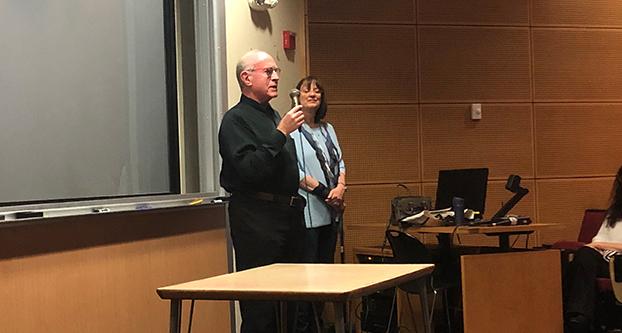Hedy Lamarr was widely recognized as one of the most beautiful faces in Hollywood in the 1930s and ‘40s. But, as the audience at last Friday’s Cineculture movie screening found out, she offered the world a lot more than a pretty face.
“Bombshell: The Hedy Lamarr Story” was shown in front of a nearly packed Peters Auditorium. The film is a documentary on Lamarr’s life, from her childhood in Austria to her death in Casselberry, Florida, in January 2000.
“Any girl can be glamorous. All you have to do is stand still and look stupid,” Lamarr said.
And Lamarr was indeed glamorous. The film showcases how her face caught the eyes of a number of powerful men in film, oil and armament. She was able to establish herself as movie star in Czechoslovakia and then in the United States.
It was her inventive mind, though, that made her such a diverse figure in the film industry, said Richard Rhodes, author of “Hedy’s Folly,” the literary basis for the film.
“She was a highly intelligent human being,” Rhodes said.
Rhodes was at the screening as the discussant and provided information for the documentary. He said his book focused much more on Lamarr’s inventor persona than the film did.
Lamarr’s interest in inventing was instilled in her by her father. When her acting career was in decline, her passion for it was renewed.
Her most successful creation came at the beginning of World War II. She concocted a guidance system for Allied torpedoes.
Her technology was not used until the 1960s, and she was not credited or celebrated for the invention until the 1990s.
That technology influenced the technology used today for Wi-Fi and Bluetooth.
“It’s truly remarkable when you really think about it. Leaving your home country, going to another country where you don’t speak the language, and somehow managing to put a life together like this one,” Rhodes said.
The film used a lot of its runtime to show the many problems that followed Lamarr after the conclusion of her acting career.
Her time in Hollywood left her with a drug addiction, little money and an undying pressure to keep the glamour that personified her for so long. That pressure manifested itself in numerous plastic surgeries.
Her two children, both of whom she had with her third husband, shared stories of how loving she was. The film later shared stories of how volatile she became because of her many issues.
After the screening, Rhodes took some time to answer questions. Mary Husain, director of CineCulture, shared her thoughts on Rhodes’ book with the audience.
“I promise I’m not being paid by the publisher or anything, but [‘Hedy’s Folly’] is an excellent read. So you should all give it a read,” Husain said.




